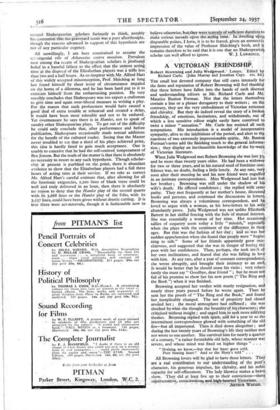A VICTORIAN FRIENDSHIP ; THE small but devoted company that still
cares intensely for the fame and reputation of Robert Browning will feel thankful that these letters have fallen into the hands of such discreet and understanding editors as Mr. Richard Curie and Mr. Matnice Buxton Forman. 'Not that the letters themselves contain a line or a phrase derogatory to their writers ; on the contrary, they are the very embodiment of Victorian reticence and chivalry. But they do indeed reveal the story of a broken friendship, of emotions, hesitations, and withdrawals, out of which a less sensitive editor might easily have contrived to twist a minor " sensation." Mr. Curie has resisted all such temptations. His introduction is a model of interpretative sympathy, alive to the inhibitions of the period, and alert to the reactions of two extremely impressionable spirits. Mr. Buxton Forman's notes add the finishing touch to the general informa. tion ; they display an inexhaustible knowledge of the by-ways of Victorian literature.
When Julia Wedgwood met Robert Browning she was just 3o, and he more than twenty years older. He had been a widower for two or three years, and in his natural need of feminine con- fidence was, no doubt, feeling a little lonely. At any rate, very soon after their meeting he and his new friend were engulfed in an intimate correspondence. Miss Wedgwood had just lost her brother ; Browning was still under the shadow of his wife's death. He offered condolence ; she replied with spit.' pathy. They met frequently at her mother's house, discussed books and persons, and continued the discussions in letters. Browning was always a voluminous correspondent, and h4 loved to argue with a woman, as his love-letters to his .wife- abundantly prove. Julia Wedgwood was not unlike Elizabeth Barrett in her skilful fencing with the foils of mutual interest. She was essentially a woman of her time. Her occasional, sallies of coquetry seem today a little " missish," especial*, when she plays with the sentiment of the difference in their ages. But that was the fashion of her day ; -Anil so was hei sudden apprehension when she found that people were " begin'; ring to talk." Some of her friends apparently grew mis7 chievous, and suggested that she was in danger of boring the poet with her confidences. Then, perhaps, she took stork of her own inclinations, and feared that she was falling in love with him. At any rate, after a year of constant correspondence, she wrote abruptly, and brought their intimacy to an endi.. It would be better that he should cease his visits ; very reluc=. tantly she must say " Goodbye, dear friend " ; but he must not fail of his promise to show her his new poem (" The Ring and the Book ") when it was finished.
Browning accepted her verdict with manly resignation, and nearly three years passed before he wrote again. Then he sent her the proofs of " The Ring and the Book," and found her inexplicably changed. The net of propriety had closed arotind her ; the moral atmosphere had stiffened ; she was shocked by what she thought the brutality of his characters ; she criticised without insight ; and urged him to seek more edifying themes. Browning replied with spirit, and for a year or so the intermittent correspondence glowed with something of the old fire—but all impersonal. Then it died down altogether ; and during the last twenty years of Browning's life they neither met nor wrote to one another. She survived him for nearly a quarter of a century, " a rather formidable old lady, whose manner was severe, and whose mind was fixed on higher things " . . .
" Nothing we know,—but that her heart grew cold, Poor beating heart ! And so the Story's told " . . .
All Browning lovers will be glad to have these letters. They
are a real contribution to our understanding of the poet's character, his generous impulses, his chivalry, and his noble capacity for self-effacement. The lady likewise makes a brave show. They did at least live up to their convictions—these conscientious-and high-hearted Victorians..


















































 Previous page
Previous page